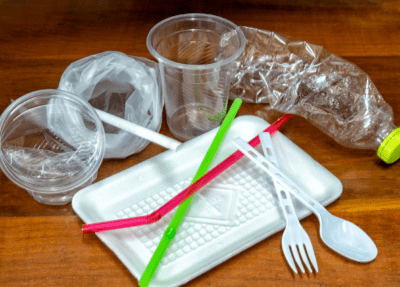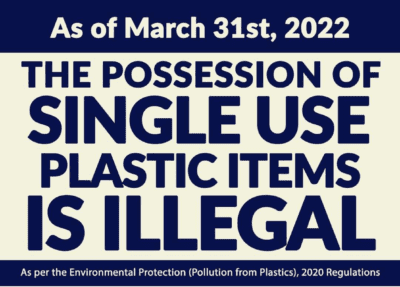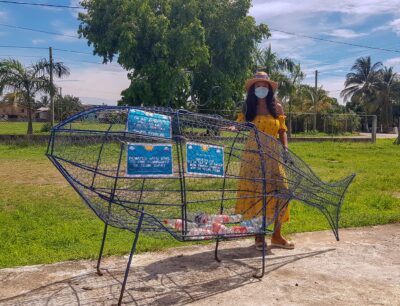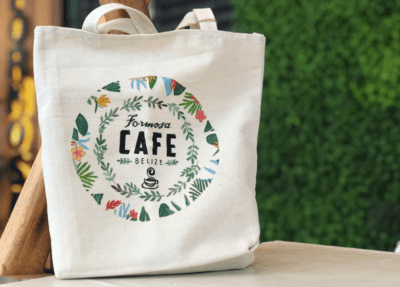September 30, 2022
No More Plastics – How Belize Backed Its Pledge To Reduce Single-Use Plastic
BY: Andrew Usher
TOPICS: Belize, Plastics, Stop Ocean Pollution
Conservation alarm bells are ringing globally and in discord, it’s easy to feel inundated by all the necessary work ahead of us—on both a local and a global scale—that’s intrinsically linked to some level of sacrifice. Perhaps it’ll be our diet, our consumption, or yes, our convenience. Thankfully, one relatively minor sacrifice of convenience has the potential to make a big impact in Belize: single-use plastic items.
On March 20, 2018, Cabinet announced that a phase-out of single-use plastic and polystyrene items would be coming into effect as of April 22, 2019. The objective: to reduce the number of plastics in Belize, transition to biodegradable products, and protect human health from the negative effects of plastic pollution. At that time, each Belizean citizen used on average eleven (11) single-use plastic bags and three (3) pieces of Styrofoam per week over a one-year period.[1] To put it into perspective, a plastic bag can last ~500 years, yet is typically only used for an average total of 12 minutes.[2]

However, it wasn’t until January 14, 2020, that the Environmental Protection (Pollution from Plastics) Regulations 2020 was signed into law, setting out a timeframe for prohibiting the importation, manufacturing, sale, and possession of the outlined products. Striking a blow against a pernicious form of pollution, it’s also designed to strike a balance between public feedback for fast action and providing businesses with adequate time to prepare, deplete existing stock, make changes to product lines, find suitable alternatives, and more. First up: a ban on all imports for April 15, 2020.
Then, COVID-19 stopped the world in its tracks. Under the circumstances, a proposed 6-month extension [1] granted on July 14, 2020, in actuality became almost a 20-month delay. On February 14, 2022, the amendment to the Pollution from Plastic Regulations with the passing of S.I. No. 17 of 2022 meant four things: redefining what national standards consider a ‘biodegradable’ product, updating the timeframe for the continued phase-out, outlining restricted items, and identifying what constitutes ‘importable’ products.
Bag Bans Are The Starting Line, Not The End Goal

Belize’s new single-use plastic ban reaching final roll-out on March 31st, 2022, with possession of prohibited items becoming illegal, was a huge victory for our oceans. However, the fight to end plastic pollution—and keep it out of our oceans—has only just begun. The aim: a systemic change to turn off the faucet and stem the flow of single-use plastic bags and polystyrene takeout containers and utensils. But in practice, that challenge continues to prove difficult in both consumer reception and vendor enforcement.
It’s not a matter of making way for environmental critics to quibble about its efficacy, but rather voicing public concern over the common thread of enforcement, or rather lack thereof.
“I’ve noticed no change in the business community around Placencia; stores, restaurants, and fast-food outlets continue to use single-use plastics [as of September 2022],” says Monique Vernon, the founder of Mister Goby and Friends Recycling. “Belize has a lot of great laws put in place to properly govern our country. But, just like those laws, without enforcement, the Environmental Protection Regulation, and the future of Belize remain unchanged.”

But it’s not as though alternatives aren’t on the market, albeit slightly more expensive than the convenience of single-use plastic or Styrofoam products. By law, all registered biodegradable alternatives must disintegrate at least 90% of their material within 365 days, as outlined [1] by the Belize Bureau of Standards. Other products may even be subject to further testing, ultimately confirming its rate of biodegradation.
Andy Lin, managing owner of Formosa Café Belize in Belmopan can attest to that. “We made the switch in early 2019, starting with one product at a time. Replacing [single-use plastic bags] with paper bags was the first step, but cups were one of our hardest switches—not just to meet our own personal quality standards, but for our customers too.” Unlike others, Lin didn’t wait until the Government of Belize began enforcement in April.

“I did it because I understand the value of environmental responsibility, government support or not, but that’s a mind shift change to internalize the ‘why’, so that any other option [besides eco-friendly] is simply too expensive: to our health, to our community, to our environment, and to the next generation.”
And while public reception is an ongoing campaign, lawmakers can bridge the gap between vendors and their resources.
“Our biggest challenge as vendors is price. We need a greater subsidy on biodegradable alternatives or a tax incentive for those of us abiding by the law while importing. Can everyone afford a 500% jump from $0.10 to $0.50 per single-use alternative? For a small business, that might be half of your profit margin,” Lin says. Convenience for convenience’s sake is because of public conditioning, expecting it without even questioning the cost. “We do have a 100% biodegradable straw, Tatami, in its trial phase with our customers right now. The feedback has been more than 85% positive.”
Not to mention, the single-use plastic ban is not all-encompassing: plastic products still remain on the market today. “And still having permits [of exemption] to import prohibited items weakens the regulation. We need harsher fines, more enforcement.” This first roll-out of a single-use plastic ban is the perfect opportunity for Belizeans to accept and embrace legislation that curbs destructive consumption and eventually, move away from plastics altogether. Indeed, if we’ve lived without them before, we can again.
What’s At Stake If We Fail
At last figures, 139,000 coastal residents rely on healthy marine ecosystems for food and jobs, with commercial fisheries alone contributing US$30 million to Belize’s annual GDP. Another 209,000 visitors are drawn to the region annually, where they spend US$81 million. Tourism—an estimated 25 percent of which is reef based—generates 41 percent of the national income [1]. Increasing refillable and reusable options by 50% would result in a reduction of plastic pollution in the ocean by up to 86%.
Hon. Anthony Mahler, Minister of Tourism and Diaspora Relations, has shared his pride before—particularly with his own stakeholders—with Oceana Belize [2]. “I am very proud to say that it is our tourism industry that has lent full support for this process to materialize in recent years. Already, we have seen many of our industry partners swap out plastics for natural and biodegradable options and guest participation as well with reusable containers and eco-friendly practices.”

What’s Lies Ahead
It will take time and energy to fully transition to a plastic-neutral destination: environmental education on the negative effects of plastic at all levels; making alternative options more accessible to the average Belizean; and proper enforcement of current regulations. No longer can we afford a linear ‘take-make-waste’ framework—one that’s so heavily reliant on the exploitation of raw materials into cheap, short-use products whose consequences are far from short-lived. In a circular economy, we stop waste being produced in the first place—a solution framework where waste is eliminated, resources are circulated, and nature is regenerated. And for that, it starts from the source, where the onus of responsible waste management begins with producers and manufacturers.
This initial transitionary period is prime for fine-tuning what potential amendments that may arise for a resilient future. It’s a matter of honoring ambition to recognize the value of individual sacrifices — one we must all take in the name of a collective good — while holding lawmakers and vendors socially accountable. That includes ensuring the current Environment Protection (Pollution from Plastics) Regulations 2020 continues to evolve as Belize has as an environmental leader—including things like PET bottles—and effectively making way for newer, innovative solutions towards a truly circular, blue economy in Belize.
- Department of the Environment
- WWF Australia
- Approval for Extension of Timeframe to Implement the Pollution from Plastics Regulations, Press Release. Government of Belize Press Office
- BELIZE STANDARD FOR BIODEGRADABLE PRODUCTS – SPECIFICATION AND LABELLING (BZS 32: 2021)
- Oceana, Whitepaper for Strategic Initiatives 24-2. Refillables, [Oceana: A. Schroeer, M. Littlejohn, H. Wilts], 2020. pg. 6
- Statistical Institute of Belize, Gross Domestic Product (2021)
- Oceana Belize
- Graphic: United Nations. The Sustainable Development Report [Responsible consumption and production, Goal 12], 2022


